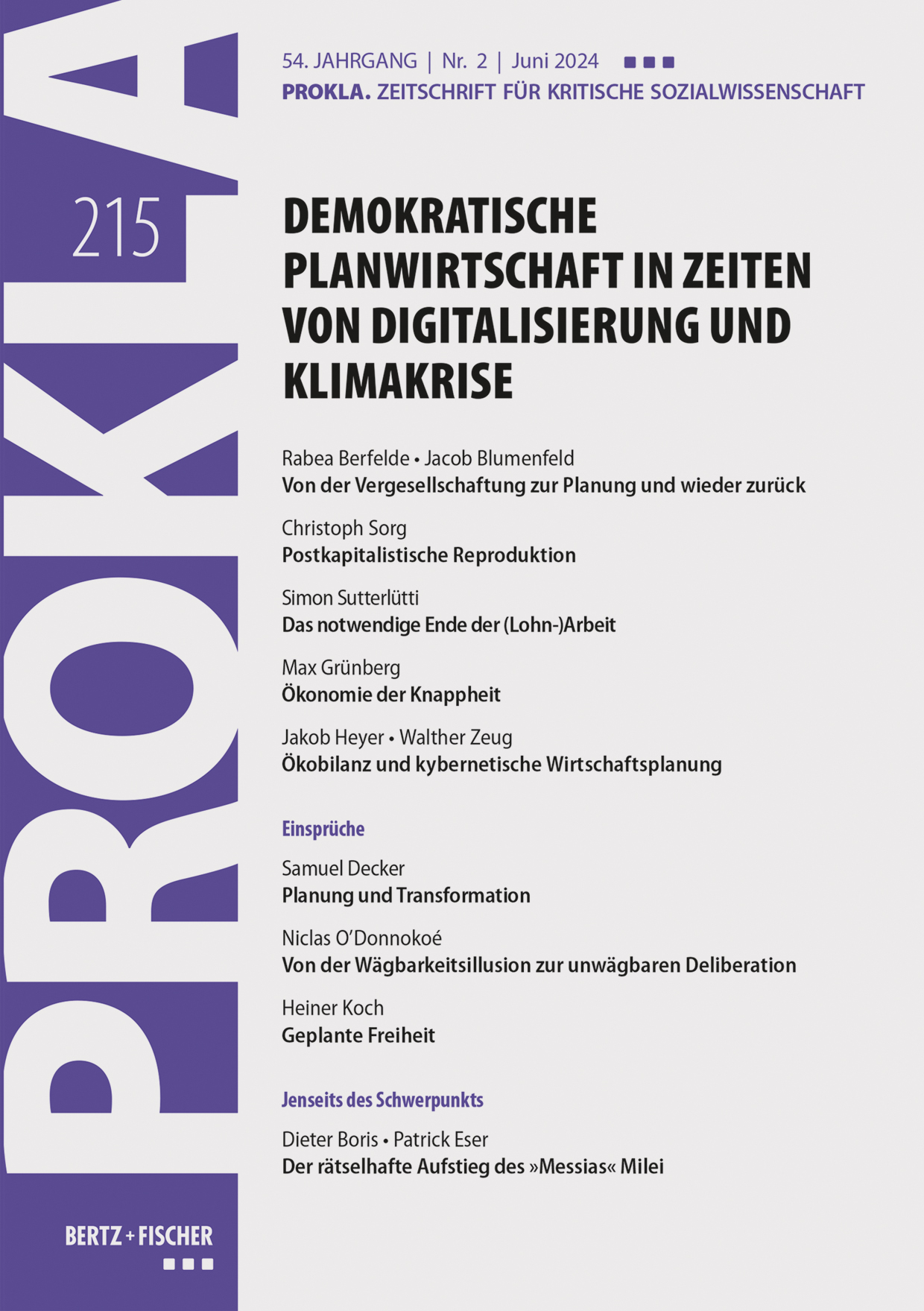Planung und Transformation
DOI:
https://doi.org/10.32387/prokla.v54i215.2120Schlagworte:
Demokratische Wirtschaftsplanung, Industriepolitik, Postkapitalismus, sozial-ökologische Transformation, TransformationstheorieAbstract
Der Beitrag zur aktuellen Debatte um demokratische Wirtschaftsplanung widmet sich der Frage, wodurch und durch welche Instrumente ein postkapitalistisches Planungssystem, eingebettet in eine breitere Agenda makroökonomischer Transformation, entwickelt werden kann. Dazu werden allgemeine Weichenstellungen und konzeptionelle Überlegungen einer Theorie postkapitalistischer Transformation und darauf aufbauend makroökonomische Instrumente diskutiert. Unter anderem wird zwischen allgemeiner öffentlicher Planung und politischer ökonomischer Planung im Kapitalismus unterschieden und der widersprüchliche und dynamische Charakter postkapitalistischer Transformation beleuchtet.
Downloads
Literaturhinweise
Abels, Joscha / Bieling, Hans-Jürgen (2022): Jenseits des Marktliberalismus? Europäische Industrie- und Infrastrukturpolitik im Zeichen neuer globaler Rivalitäten. In: PROKLA 208 52(3): 429-449. DOI: https://doi.org/10.32387/prokla.v52i208.2004. DOI: https://doi.org/10.32387/prokla.v52i208.2004
Alami, Ilias / Copley, Jack / Moraitis, Alexis (2023): The ›wicked trinity‹ of late capitalism: Governing in an era of stagnation, surplus humanity, and environmental breakdown. In: Geoforum: 103691. DOI: https://doi.org/10.1016/j.geoforum.2023.103691. DOI: https://doi.org/10.1016/j.geoforum.2023.103691
Albert, Michael J. (2020): Beyond continuationism: climate change, economic growth, and the future of world (dis)order. In: Cambridge Review of International Affairs 35(6): 868-887. DOI: https://doi.org/10.1080/09557571.2020.1825334. DOI: https://doi.org/10.1080/09557571.2020.1825334
Daum, Timo / Nuss, Sabine (Hg.) (2021): Die unsichtbare Hand des Plans. Koordination und Kalkül im digitalen Kapitalismus. Berlin.
Brand, Ulrich (2016): How to get out of the multiple crisis? Contours of a critical theory of social-ecological transformation. In: Environmental Values 25(5): 503-525. DOI: https://doi.org/10.3197/096327116X14703858759017. DOI: https://doi.org/10.3197/096327116X14703858759017
– / Görg, Christoph / Wissen, Markus (2019): Overcoming neoliberal globalization: social-ecological transformation from a Polanyian perspective and beyond. In: Globalizations 17(1): 161-176. DOI: https://doi.org/10.1080/14747731.2019.1644708. DOI: https://doi.org/10.1080/14747731.2019.1644708
Brie, Michael (Hg.) (2016): Futuring. Perspektiven der Transformation im Kapitalismus über ihn hinaus. Wiesbaden.
Bulfone, Fabio (2022): Industrial policy and comparative political economy: A literature review and research agenda. In: Competition & Change 27(1): 22-43. DOI: https://doi.org/10.1177/102452942210762. DOI: https://doi.org/10.1177/10245294221076225
Callinicos, Alexis (2007): Does capitalism need the state system? Cambridge Review of International Affairs 20(4): 533-549. DOI: https://doi.org/10.1080/09557570701680464. DOI: https://doi.org/10.1080/09557570701680464
Decker, Samuel (2020): On the Transformative Potential of the ›Green New Deal‹. In: Journal für Entwicklungspolitik 36(4): 51-73. DOI: https://doi.org/10.20446/JEP-2414-3197-36-4-51. DOI: https://doi.org/10.20446/JEP-2414-3197-36-4-51
– (2021). Mit dem Grundgesetz in den Sozialismus? In: Jacobin (21.5.2021). URL: https://jacobin.de/artikel/grundgesetz-sozialismus-artikel-15-vergesellschaftung-enteignung-abendroth-planwirtschaft-daniel-e-saros, Zugriff: 1.3.2024.
– (2022): Die Krise verändert ihr Gesicht. In: LuXemburg 3/2022. URL: https://zeitschrift-luxemburg.de/artikel/die-krise-veraendert-ihr-gesicht/, Zugriff: 1.3.2024.
– (2024). The Question of Transformation – Approaches to Economic Planning in Existing Policy Proposals. In: Groos/Sorg (2024, im Erscheinen).
Devine, Pat (2002). Participatory Planning through Negotiated Coordination. In Science & Society 66(1): 72-85. DOI: https://doi.org/10.1521/siso.66.1.72.21001. DOI: https://doi.org/10.1521/siso.66.1.72.21001
– (1988). Democracy and Economic Planning. Cambridge.
Elias-Pinsonnault, Sophie / Dufour, Mathieu / Tremblay-Pepin, Simon (2023): An international interface: Democratic planning in a global context. In: Competition & Change 0(0). DOI: https://doi.org/10.1177/10245294231212681. DOI: https://doi.org/10.1177/10245294231212681
Engler, John-Oliver u.a. (2024): 15 years of degrowth research: A systematic review. In: Ecological Economics 218: 108101. DOI: https://doi.org/10.1016/j.ecolecon.2023.108101. DOI: https://doi.org/10.1016/j.ecolecon.2023.108101
Feola, Guiseppe / Vincent, Olga / Moore, Danika (2021): (Un)making in sustainability transformation beyond capitalism. In: Global Environmental Change 69: 102290. DOI: https://doi.org/10.1016/j.gloenvcha.2021.102290. DOI: https://doi.org/10.1016/j.gloenvcha.2021.102290
Foster, John / Metcalfe, J. Stan (2012): Economic emergence: An evolutionary economic perspective. In: Journal of Economic Behavior Organization 82(2-3): 420-432. DOI: https://doi.org/10.1016/j.jebo.2011.09.008. DOI: https://doi.org/10.1016/j.jebo.2011.09.008
Groos, Jan / Sorg, Christoph (Hg.): (2024): Creative Construction: Democratic Planning in the 21st Century: Bristol (im Erscheinen).
Heyer, Jakob (2024): Basic Problems of a Democratically Planned Economy. A Meta-Model. In: Groos/Sorg (2024, im Erscheinen).
Jessop, Bob (2002): The Future of the Capitalist State. Cambridge.
Jones, Campell (2020): Special Issue: The Return of Economic Planning. South Atlantic Quarterly 119(1): 133-151. DOI: https://doi.org/10.1215/00382876-8007701. DOI: https://doi.org/10.1215/00382876-8007701
Klein, Dieter (2021): Regulation in einer solidarischen Gesellschaft: Wie eine sozial-ökologische Transformation funktionieren könnte. Hamburg.
Krölls, Albert (1988): Das Grundgesetz als Verfassung des staatlich organisierten Kapitalismus. Wiesbaden. DOI: https://doi.org/10.1007/978-3-322-91784-3. DOI: https://doi.org/10.1007/978-3-322-91784-3
Labour Party (1974). Britain will win with Labour. URL: http://www.labour-party.org.uk/manifestos/1974/oct/1974-oct-labour-manifesto.shtml, Zugriff: 1.3.2024.
Laibman, David / Campbell, Al (2022): Special Issue: (En)Visioning Socialism IV. Science & Society 86(2): 137-139. DOI: https://doi.org/10.1521/siso.2022.86.2.137. DOI: https://doi.org/10.1521/siso.2022.86.2.137
Linnér, Björn-Ola / Wibeck, Victoria (2020): Conceptualising variations in societal transformations towards sustainability. In: Environmental Science and Policy 106: 221-227. DOI: https://doi.org/10.1016/j.envsci.2020.01.007. DOI: https://doi.org/10.1016/j.envsci.2020.01.007
Lutosch, Heide (2024): Embracing the Small Stuff – Caring for Children in a Liberated Society. In: Sorg/Groos (2024, im Erscheinen).
Luxemburg, Rosa (2018 [1899]): Sozialreform oder Revolution. Grafrath.
Offe, Claus (1972): Strukturprobleme des kapitalistischen Staates. Frankfurt/M.
Pahl, Hanno (2008): Das Geld in der modernen Wirtschaft. Marx und Luhmann im Vergleich. Frankfurt/M.
Patnaik, Prahbat (2010): Socialism or Reformism? Social Scientist 38(5/6): 3-21.
Poulantzas, Nicos (2002): Staatstheorie. Politischer Überbau, Ideologie, Autoritärer Etatismus. Hamburg.
Sorg, Christoph (2023): Finance as a form of planning. In: Competition & Change 0(0). DOI: https://doi.org/10.1177/10245294231217578. DOI: https://doi.org/10.1177/10245294231217578
– (2022): Failing to Plan Is Planning to Fail: Toward an Expanded Notion of Democratically Planned Postcapitalism. In: Critical Sociology 49(3): 475-493. DOI: https://doi.org/10.1177/08969205221081058. DOI: https://doi.org/10.1177/08969205221081058
– / Groos, Jan (2023): Special Issue: Rethinking Economic Planning. Competition & Change.
Vettese, Troy / Pendergrass, Drew / Mesko, Filip (2022): Town, Country and Wilderness: Planning the Half?Earth. In: Architectural Design 92(1): 112-119. DOI: https://doi.org/10.1002/ad.2780. DOI: https://doi.org/10.1002/ad.2780
Warner, Neil (2022): Roads to no alternative: the rejection of proposals for the socialisation of investment in Britain, France and Sweden, 1973-1983. SASE conference paper.
Wright, Erik Olin (2010): Envisioning Real Utopias. London.






